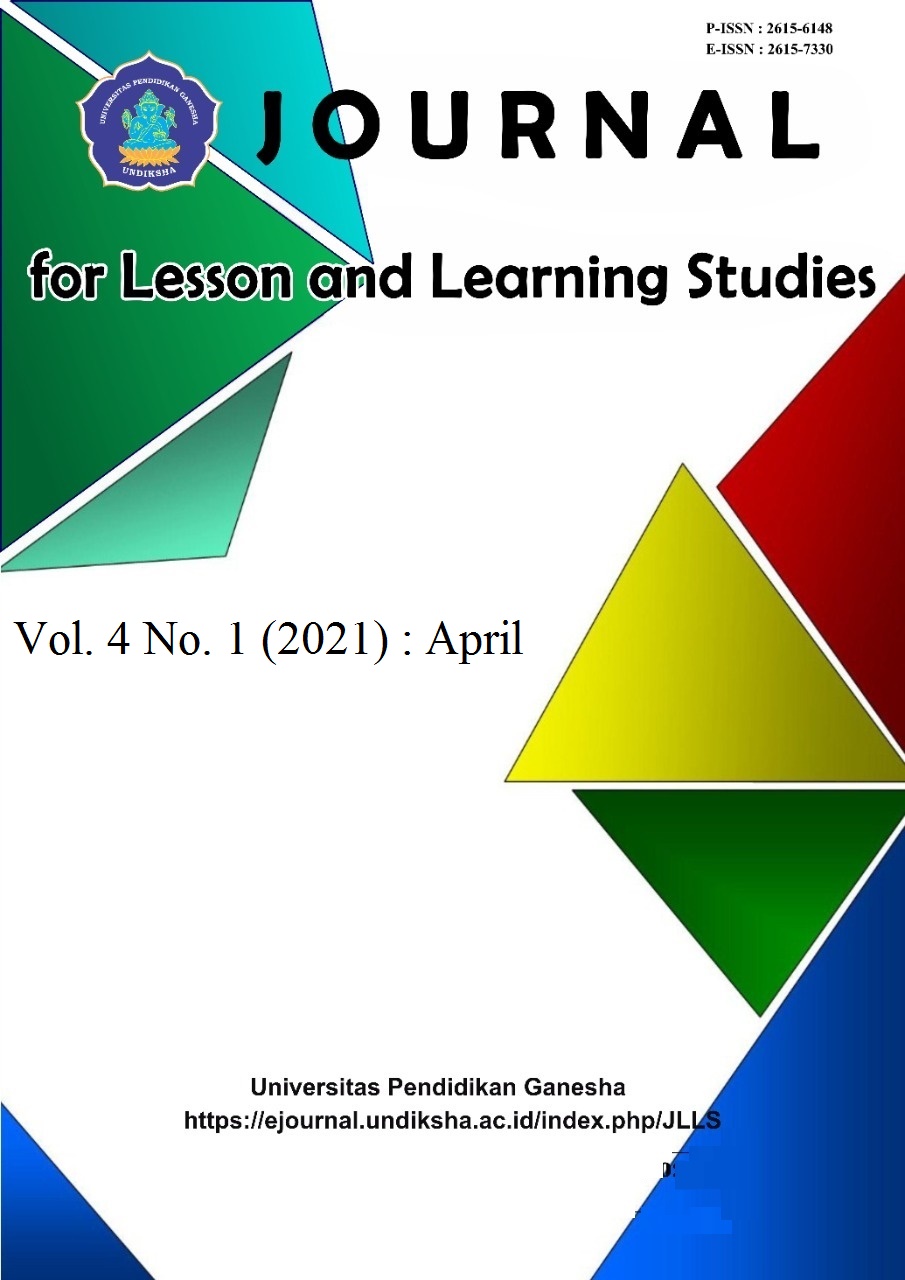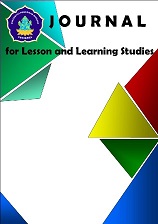Teacher Constraints in Preparing Lesson Plan through Google Classroom
DOI:
https://doi.org/10.23887/jlls.v4i1.34663Keywords:
Constraint, Lesson Plan, Google ClassroomAbstract
Implementing an effective teaching and learning process with the integration of online learning platforms is important for teachers, to maximize the online learning process. The purpose of this study is to analyze the obstacles in compiling the integrated lesson plans for google classroom. This study uses a qualitative design as a research design. The research subject in this study was an English teacher. The instrument used in this is a questionnaire containing aspects such as learning, learning materials, learning activities, media and learning resources, and learning objectives. The results show that there are several dominant obstacles, including online learning media as an intermediary for students in collecting results, online learning media that are only used to collect assignments, teachers have difficulty assessing student work from these activities, online learning platforms that are only used for conveying the material, type and technique of the assessment cannot be assessed from the activity. Based on the results of the study, it can be said that teachers experience several dominant obstacles in preparing lesson plans so that they need to be resolved by teachers through mastering five aspects of lesson plan so that they can be adapted to dynamic teaching and learning situations.
References
Adnan, M., & Anwar, K. (2020). Online Learning amid the COVID-19 pandemic: Students’ Perspectives. Journal of Pedagogical Sociology and Psychology, 2(1), 45–51. https://doi.org/10.46627/silet.v1i3.46.
Ali, W. (2020). Online and Remote Learning in Higher Education Institutes: A Necessity in light of COVID-19 Pandemic. Higher Education Studies, 10(3), 16. https://doi.org/10.5539/hes.v10n3p16.
Alqudah, N. M., Jammal, H. M., Saleh, O., Khader, Y., Obeidat, N., & Alqudah, J. (2020). Perception and experience of academic Jordanian ophthalmologists with E-Learning for undergraduate course during the COVID-19 pandemic. Annals of Medicine and Surgery, 59(June), 44–47. https://doi.org/10.1016/j.amsu.2020.09.014.
Apsari, Y. (2013). Teachers’ Problems and Solutions in Implementing Curriculum 2013. Journal of STKIP Siliwangi Bandung, 11–23.
Bashooir, K., & Supahar, S. (2018). Validitas dan reliabilitas instrumen asesmen kinerja literasi sains pelajaran Fisika berbasis STEM. Jurnal Penelitian Dan Evaluasi Pendidikan, 22(2), 168–181. https://doi.org/10.21831/pep.v22i2.20270.
Bin-Hady, W. R. A., & Abdulsafi, A. S. T. (2019). How Can I Prepare an Ideal Lesson-Plan? SSRN Electronic Journal, 7(4). https://doi.org/https://doi.org/10.2139/ssrn.3434031.
Chimmalgi, M. (2018). Off-line virtual microscopy in teaching histology to the undergraduate medical students: do the benefits correlate with the learning style preferences? Journal of the Anatomical Society of India, 67(2), 186–192. https://doi.org/10.1016/j.jasi.2018.11.010.
Dian, K., & Sri, J. (2017). Pengembangan Perangkat Pembelajaran Matematika Model 4D Untuk Kelas Inklusi Sebagai Upaya Meningkatkan Minat Belajar Siswa. Jurnal MAJU, 4(1), 38–50. https://ejournal.stkipbbm.ac.id/index.php/mtk/article/view/71.
Evriana, L. (2020). The Implementation of Online Assessment in English Lesson at 10th Grade Student of SMA Nasional 3 Bahasa Putera Harapan. State Institute of Islamic Studies Purwokerto.
Fuadi, T. M., Musriandi, R., & Suryani, L. (2020). Covid-19 : Penerapan Pembelajaran Daring Di Perguruan Tinggi. Jurnal Dedikasi Pendidikan, 4(2), 193–200.
Gao, B. W., Jiang, J., & Tang, Y. (2020). The effect of blended learning platform and engagement on students’ satisfaction—— the case from the tourism management teaching. Journal of Hospitality, Leisure, Sport and Tourism Education, 27(November 2019), 100272. https://doi.org/10.1016/j.jhlste.2020.100272.
Ghavifekr, S., & Rosdy, W. A. W. (2015). Teaching and learning with technology: Effectiveness of ICT integration in schools. International Journal of Research in Education and Science, 1(2), 175–191. https://doi.org/10.21890/ijres.23596.
Hussaini, I., Ibrahim, S., Wali, B., Libata, I., & Musa, U. (2020). Effectiveness of Google Classroom as a Tool For Teaching and Learning. International Journal of Evidence Based Nursing, 4(4), 3–7. https://doi.org/10.37628/ijebn.v3i2.1606.
Hwang, G. J., Hung, C. M., & Chen, N. S. (2014). Improving learning achievements, motivations and problem-solving skills through a peer assessment-based game development approach. Educational Technology Research and Development, 62(2), 129–145. https://doi.org/10.1007/s11423-013-9320-7.
Kenedi, J., Gumono, G., & Suryadi, S. (2021). Perbedaan Kemampuan Menulis Teks Prosedur Sebelum dan Sesudah Menggunakan Media Google Classroom Siswa Kelas XI SMA Negeri 6 Kota Bengkulu. SILAMPARI BISA, 4(1), 181–196. https://doi.org/https://doi.org/10.31540/silamparibisa.v4i1.1293.
Kniffin, K. M., Narayanan, J., Anseel, F., Antonakis, J., Ashford, S. P., Bakker, A. B., Bamberger, P., Bapuji, H., Bhave, D. P., Choi, V. K., Creary, S. J., Demerouti, E., Flynn, F. J., Gelfand, M. J., Greer, L. L., Johns, G., Kesebir, S., Klein, P. G., Lee, S. Y., … Vugt, M. van. (2021). COVID-19 and the workplace: Implications, issues, and insights for future research and action. American Psychologist, 76(1), 63–77. https://doi.org/10.1037/amp0000716.
Kurniawati, M., Santanapurba, H., & Kusumawati, E. (2019). Penerapan Blended Learning Menggunakan Model Flipped Classroom Berbantuan Google Classroom Dalam Pembelajaran Matematika SMP. EDU-MAT: Jurnal Pendidikan Matematika, 7(1), 8–19. https://doi.org/10.20527/edumat.v7i1.6827.
Mahitsa, M., Mahardini, A., & Fisika, P. (2020). ANALISIS SITUASI PENGGUNAAN GOOGLE CLASSROOM PADA Email : mayamahitsa@gmail.com Abstrak PENDAHULUAN Pada akhir Desember dunia adanya dikejutkan suatu dengan penyakit berita yang Kasus covid-19 pertama di luar China dilaporkan di Thailand pada 13 Januari 2.
Mauliate, H. D., Rahmat, A., & Wachidah, S. (2019). Evaluation the Lesson Plan of English Language Learning in Junior High School, Seraphine Bakti Utama West Jakarta. International Journal of Scientific Research and Management, 7(07), 1078–1086. https://doi.org/10.18535/ijsrm/v7i7.el02.
O’Flaherty, J., & Costabile, M. (2020). Using a science simulation-based learning tool to develop students’ active learning, self-confidence and critical thinking in academic writing. Nurse Education in Practice, 47(January), 102839. https://doi.org/10.1016/j.nepr.2020.102839.
Oktafianti, T. (2019). An Analysis of Lesson Plan made by an English Teacher referring to Curriculum 2013 at MTS Al-Qur’an Harsallakum Bengkulu in Academic Year 2018/2019. State Institute for Islamic Studies (IAIN) Bengkulu.
Permata, A., & Bhakti, Y. B. (2020). Keefektifan Virtual Class dengan Google Classroom dalam Pembelajaran Fisika Dimasa Pandemi Covid-19. JIPFRI (Jurnal Inovasi Pendidikan Fisika Dan Riset Ilmiah), 4(1), 27–33. https://doi.org/10.30599/jipfri.v4i1.669.
Pheeraphan, N. (2013). Enhancement of the 21st Century Skills for Thai Higher Education by Integration of ICT in Classroom. Procedia - Social and Behavioral Sciences, 103, 365–373. https://doi.org/10.1016/j.sbspro.2013.10.346.
Phungsuk, R., Viriyavejakul, C., & Ratanaolarn, T. (2017). Development of a problem-based learning model via a virtual learning environment. Kasetsart Journal of Social Sciences, 38(3), 297–306. https://doi.org/10.1016/j.kjss.2017.01.001.
Purwaningrat, K. W., Antara, P. A., & Suarjana, I. M. (2021). Instrumen Penilaian Perseptual Motorik Siswa Pada Mata Pelajaran SBdP SD. MIMBAR PGSD Undiksha, 9(1), 128–138. https://doi.org/http://dx.doi.org/10.23887/jjpgsd.v9i2.33225.
Rahardjo, M. M. (2016). Menciptakan High Level of Play Dalam Rencana Pembelajaran Anak Usia Dini. Scholaria : Jurnal Pendidikan Dan Kebudayaan, 6(3). https://doi.org/10.24246/j.scholaria.2016.v6.i3.p206-216.
Ramadhani, R., Astuti, E., & Setiawati, T. (2019). THE IMPLEMENTATION OF LMS-GOOGLE CLASSROOM TO IMPROVING COMPETENCE SKILL OF SENIOR HIGH SCHOOL TEACH ERS ’ IN INDUSTRIAL REVOLUTION 4 . 0 Salah satu dampak dari perkembangan Revolusi Industri 4 , 0 dalam dunia pendidikan adalah integrase teknologi dalam p. Amaliah : Jurnal Pengabdian Kepada Masyarakat, 3(2), 327–335. https://doi.org/https://doi.org/10.32696/ajpkm.v3i2.286.
Sadikin, A., & Hamidah, A. (2020). Pembelajaran Daring di Tengah Wabah Covid-19. Biodik, 6(2), 109–119. https://doi.org/10.22437/bio.v6i2.9759.
Suciati, R., & Astuti, Y. (2019). Analisis Rencana Pelaksanaan Pembelajaran (Rpp) Mahasiswa Calon Guru Biologi. Edusains, 8(2), 192–200. https://doi.org/10.15408/es.v8i2.4059.
Suciati, S. (2020). Peningkatan Kreatfitas dan Inisiatif Guru melalui Model Pembelajaran Daring pada masa Pandemi Covid-19. Ideguru: Jurnal Karya Ilmiah Guru, 5(1), 79–85.
Sulistyowati, Y. (2014). Pengembangan Perangkat Pembelajaran Bangun Ruang di SMP dengan Pendekatan Creative Problem Solving. Pythagoras: Jurnal Pendidikan Matematika, 9(2), 219–232. https://doi.org/10.21831/pg.v9i2.9082.
Supahar, S., & Prasetyo, Z. K. (2015). Pengembangan Instrumen Penilaian Kinerja Kemampuan Inkuiri Peserta Didik Pada Mata Pelajaran Fisika Sma. Jurnal Penelitian Dan Evaluasi Pendidikan, 19(1), 96–108. https://doi.org/10.21831/pep.v19i1.4560.
Suprihatiningrum, J. (2020). Is Online Learning Accessible During COVID-19 Pandemic ? Voices and Experiences of UIN Sunan Kalijaga Students with Disabilities Introduction People with disabilities are frequently at increased risk during disasters and emergencies . Physical and communi. Nadwa : Jurnal Pendidikan Islam, 14(1), 1–38. https://doi.org/10.21580/nw.2020.14.1.5672.
Suryaman, M., Cahyono, Y., Muliansyah, D., Bustani, O., Suryani, P., & Fahlevi, M. (2020). Covid-19 Pandemic and Home Online Learning System: Does it Affect the Quality of Pharmacy School Learning? Sys Rev Pharm, 11(8), 524–530.
Widyantara, I., & Rasna, I. (2020). PENGGUNAAN MEDIA YOUTUBE SEBELUM DAN SAAT PANDEMI COVID-19 DALAM PEMBELAJARAN KETERAMPILAN BERBAHASA PESERTA DIDIK. Jurnal Pendidikan Dan Pembelajarna Bahasa Indonesia, 9(2). https://ejournal-pasca.undiksha.ac.id/index.php/jurnal_bahasa/article/view/3531.
Wulandari, A. I., & Radia, E. H. (2021). Pengembangan Instrumen Penilaian Sikap Tanggung Jawab Pembelajaran Tematik Terpadu Kelas V SD. MIMBAR PGSD Undiksha, 9(1), 10–18. https://doi.org/http://dx.doi.org/10.23887/jjpgsd.v9i1.32979.
Yuliani, E., & Saputri, R. K. (2021). Perbandingan Penggunaan Platform Google Classrom dan Grup Whatsapp Dalam Pembelajaran Online Selama Pandemi Covid-19. Jurnal Educatio FKIP UNMA, 7(1), 238–243. https://doi.org/10.31949/educatio.v7i1.934.
Downloads
Published
How to Cite
Issue
Section
License
Authors who publish with the Journal for Lesson and Learning Studies agree to the following terms:
- Authors retain copyright and grant the journal the right of first publication with the work simultaneously licensed under a Creative Commons Attribution License (CC BY-SA 4.0) that allows others to share the work with an acknowledgment of the work's authorship and initial publication in this journal.
- Authors are able to enter into separate, additional contractual arrangements for the non-exclusive distribution of the journal's published version of the work (e.g., post it to an institutional repository or publish it in a book), with an acknowledgment of its initial publication in this journal.
- Authors are permitted and encouraged to post their work online (e.g., in institutional repositories or on their website) prior to and during the submission process, as it can lead to productive exchanges, as well as earlier and greater citation of published work. (See The Effect of Open Access)





